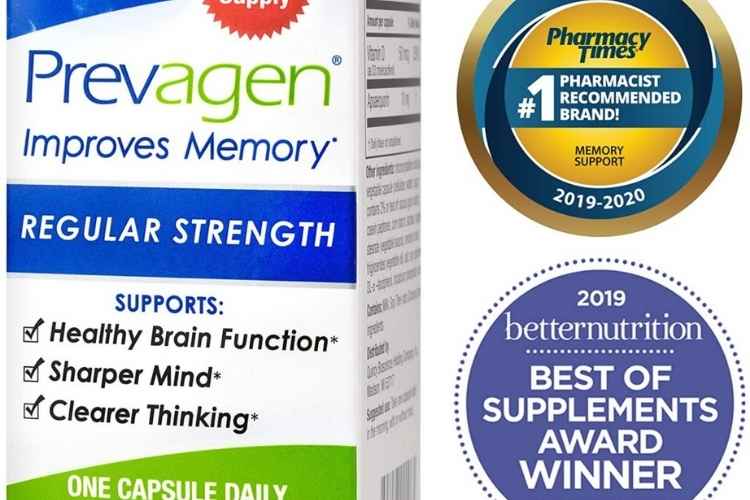Prevagen and Cognium are two well-known and popular supplements that claim to have similar benefits. Both Prevagen and Natrol Cognium supposedly help your memory and cognition. Both are generally characterized as brain health supplements.
So how do they compare to each other? Below, we cover what you should know about the two supplements, including which is overall a better option. We should note, we don’t include Cognium or Prevagen side effects the FDA lists, because the FDA doesn’t regulate supplements. We have to primarily learn more about the side effects by studying the individual ingredients, and researching customer reviews.
What’s Prevagen?
Prevagen is an over-the-counter brain health supplement. The company that makes it, Quincy Bioscience, claims Prevagen can help improve your memory when experiencing age-related decline.
Prevagen isn’t a treatment for serious memory disorders like dementia or Alzheimer’s.
This OTC supplement is taken once a day. You can find it in capsule and chewable tablet form. Each product contains vitamin D3 and varying amounts of a protein called apoaequorin, originally found in some types of jellyfish.
You can choose varying strengths of Prevagen—10, 20, or 40 mg of apoaequorin.
There is very limited research on Prevagen, and the only major study was done by the company that manufactures it. That study is what’s used in all the marketing and advertising for the supplement.
The idea of the memory supplement is that the apoaequorin binds to excess calcium in the brain. High levels of calcium and calcium dysregulation in the brain are thought to be one of the reasons memory declines as we age. Since apoaequorin might reduce calcium levels, it could help memory.
Along with the lack of evidence, there are some issues with this. The biggest is that proteins are digested well before crossing the blood-brain barrier. There are some indications that, as a result, Prevagen would never even make it to the brain.
We also don’t know much about the side effects since the research is limited and didn’t go past 90 days.
What is Cognium?
Cognium is also a brain health supplement from the Natrol company.
The supplement contains a silk protein hydrolysate found in silkworm cocoon threads. In vitro studies show that Cognium can be like an antioxidant for the brain, protecting it from damaging and aging free radicals and oxidative stress.
The silk protein hydrolysate is also known as Brain Factor 7.
According to Cognium marketing, in research, taking the product for just four weeks led to statistically significant improvements in cognition. However, the issue with Cognium’s cited research is that at least several studies cited using silk protein hydrolysate were in children and young adults without any cognitive issues.
Nine studies from Korea are used as evidence to back up Cognium, but several are from animal data.
We don’t know if any study participants were older people with memory issues, which is where the product is targeted primarily.
If you use Cognium, you’re supposed to take two capsules daily—one in the morning and one in the evening.
Most people don’t experience side effects, but if they do, they’re usually mild like stomach upset or headache.
What Do Customers Say?
When looking at customer reviews, most people say similar things about Prevagen and Cognium.
Many customers don’t find they’re effective, although most people don’t feel they experience any side effects either.
Across the board, with both memory supplements, it seems the best results come from using them daily for at least several weeks to see if you notice any improvements.
Price Comparison
Cognium is cheaper than Prevagen, with each capsule or tablet costing around $0.21. Prevagen costs around $1.07 per tablet or capsule.
Safety and Side Effects
Both Prevagen and Cognium are considered safe for most people, but there are stipulations.
First, no supplements are regulated by the FDA in the United States.
Second, neither Prevagen nor Cognium has strong, long-term data so that we can truly know the potential side effects or risks.
Another factor in discussing safety is the fact that supplements can affect people in entirely different ways. What works well for one person could cause side effects for another, particularly if you have a chronic or underlying health condition or take any medications.
Which Comes Out On Top?
Both Prevagen and Cognium have some pretty big weaknesses. Namely, there’s not enough research to know if either can help memory. Both include protein-based ingredients, however, and it’s unlikely that, as a result, they could cross the blood-brain barrier.
Rather than trying Prevagen or Cognium, you might want to improve your diet to help your memory. Regular exercise is also good for boosting memory and cognition.

